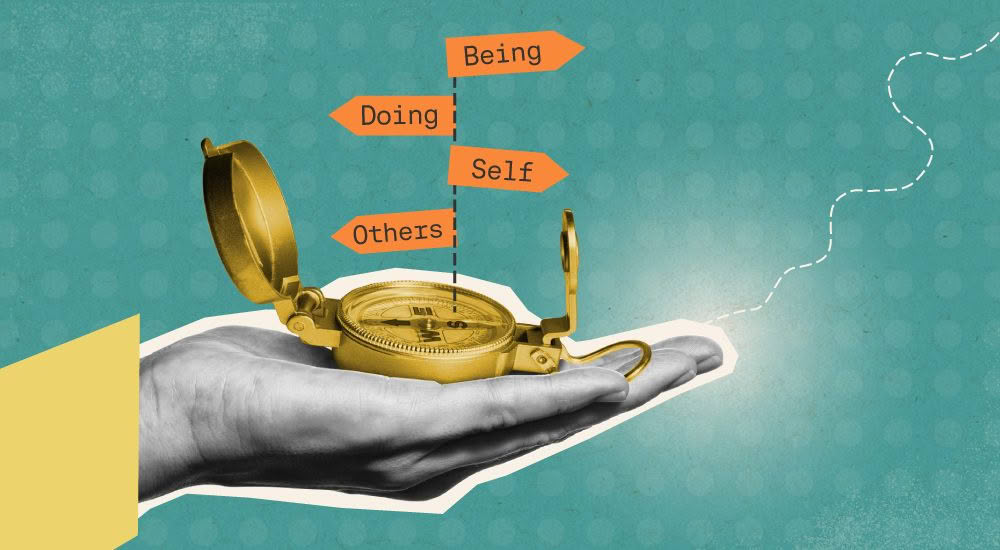
Why we don’t talk about meaning at work: MIT Sloan Management Review
- Academic Articles

The Map of Meaning® framework was developed through Dr. Marjolein Lips-Wiersma’s groundbreaking doctoral research. In this interview, she recounts that fascinating journey and what it taught her about how humans find meaning at work and beyond.
The Map of Meaning ® is a deceptively simple tool with an enormous impact. Developed through rigorous research by Dr. Marjolein Lips-Wiersma, the Map is a visual framework that breaks down the human experience of meaning into four interconnected pathways and three tensions. It’s been used to help individuals and organizations around the world create more meaningful work, and you may know it as the framework on which the Meaningful Work Inventory (MWI) is based. But have you ever wondered where this framework came from? Where did it all start, and how does one go about researching a topic as ineffable as meaning?
You may be surprised to learn that Lips-Wiersma, or “Marjo” as she’s known to friends and colleagues, didn’t set out to study meaning at all—let alone to design a framework for it. Her doctoral thesis is about the implications of individual spirituality within the workplace. In her research interviews, however, certain themes emerged that spoke to a broader human truth. Regardless of our individual beliefs, you see, we humans are wired to seek meaning. And as we move toward what matters to us most, Lips-Wiersma’s research showed, there are predictable factors that influence our experience of meaning. The Map of Meaning illustrates these key factors and shows how they all work together.
Marjo spoke with us over Zoom from her home in New Zealand, where she is a professor of ethics and sustainability leadership at Auckland University of Technology. We discussed her early experiences of work, the fascinating research journey that led to the development of the Map, the difference between meaning and purpose, and the value she sees in MeaningSphere’s offerings.
MeaningSphere: Could you share where you’re from, and how this may have shaped your ideas about work?
Marjolein Lips-Wiersma: I was raised on a small farm in the north of the Netherlands. My dad was a trader, and my mom had two florist shops. I had the privilege of actually seeing my parents working. I think so many people, your parents go away, and then they come back, and you have no idea what they do. But quite early on, I got involved in their work: My dad would take me to places where they bought and sold cows. And my mom, I think when I was about 10 or 11, I got to work in [her] shop for 25 cents a day, or something. Very little, but you know it was more the learning of it. Seeing work, I think, had something to do with me being interested in work.
I was not somebody who immediately knew what I wanted to study or why. So I did a bit of this, bit of that. I worked for a while as a secretary, for instance, for one of those bureaus that hire you out for a month here, two months there. I worked in some factories. I worked in a hospital, but all as just temporary work.
MS: It’s almost like you got to be a nomad in the world of work. I’m sure you had observations about what works, what doesn’t, the different norms that exist, and cultures. Did that help you advance your thinking?
MLW: I think it did, because at some places you felt straight at home, and you felt comfortable working there. I remember places, like some law office where we would literally just fall off our chairs, laughing. There was a sense of humor in the whole workplace, and I don’t know what that was, but it was fun. Or people were encouraging, or you felt that you could just try something. So there were places of work where you could be human, I think, and there were places of work that shut you down.
MS: You were already kind of doing your research without realizing it.
MLW: That’s right. At a young age where you’re just wanting to learn. And you’re just observing.
MS: So much of what we learn about work takes place in university, but sometimes university is not the best place to learn.
MLW: Well, for me altogether, formal learning was not the best. I spent–certainly at high school–a large proportion of my time not being there. I think I was just bored.
MS: Now you would say that you were “unengaged.”
MLW: Yes, exactly. I was unengaged. My first bachelor’s degree, in business studies, wasn’t really the best place for me to learn as well. I think it’s not until you do your masters that you can actually do that self-driven learning. You can start pursuing your own interests. You’re all of a sudden in smaller classes, so you can ask questions, and they’ll speak directly to you and answer your question rather than kind of just throw stuff at large groups of people. So in that sense, I think I started to engage, when the system also started to engage with me.
MS: Can you take me through the timeline of your move to New Zealand and your eventual Ph.D work there?
MLW: I was 28 when I moved to New Zealand, and I would have been 29, 30 when I did my master’s. And then, as I was doing my master’s, the university in the biggest city here, Auckland, gave me a scholarship to do my Ph.D.
I did it on diversity, initially. It interested me. I wrote, “Maybe diversity shouldn’t be managed as much as it should be celebrated.”
And then my supervisor said, “Well, maybe, but where do you get that from? You can’t just say that.”
And I said, “Well, that’s from my own spiritual background.”
And then I thought, “Gosh, actually, this is much more of an interesting question: Can people freely express their spiritual beliefs? And what does that contribute? And where is that hindering? Where is that not helpful? And where is that actually quite helpful?”
And so that’s how I then shifted to doing the Ph.D. on how people bring their spirituality into the workplace.
To read the rest of this engaging interview head to the MeaningSphere website Blog Page.